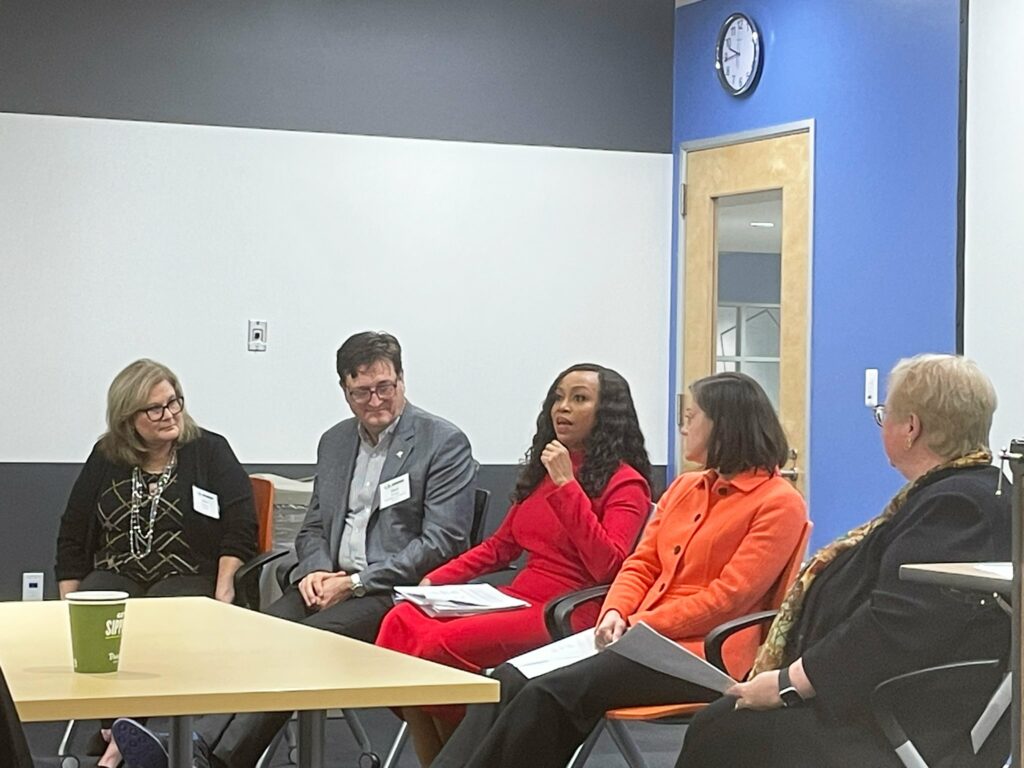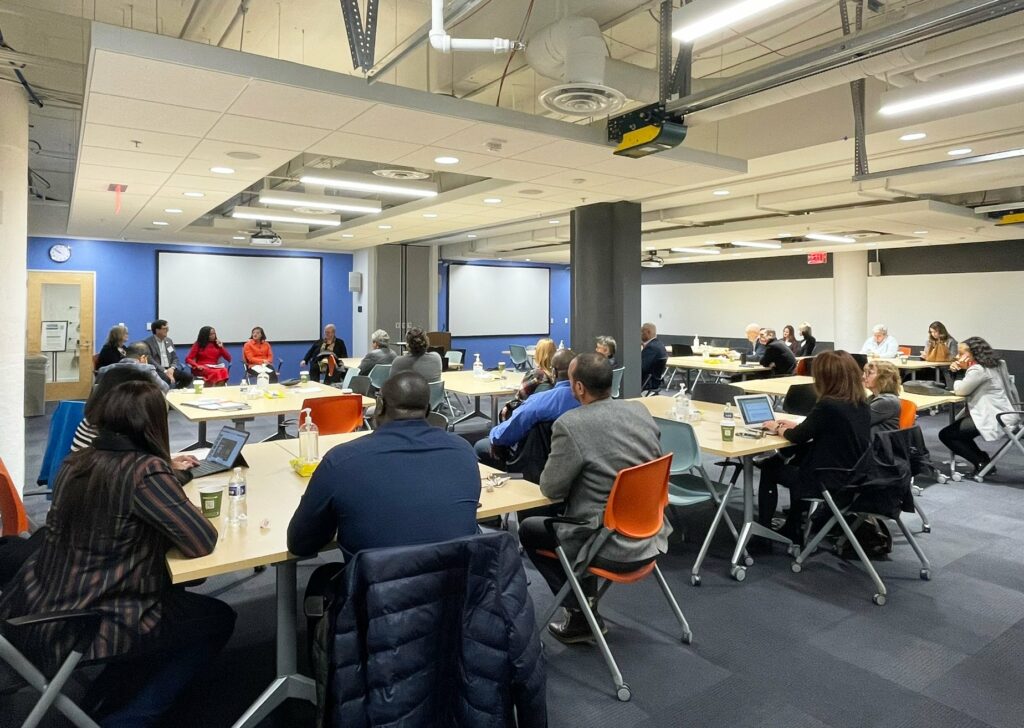This Month’s Message from Terry Barclay, SBN Detroit chair and CEO of Inforum

On Oct. 31, SBND hosted a panel focusing on business and sustainability in the Great Lakes region. The event was a collaboration with the Council of the Great Lakes Region and featured Shanelle Jackson, senior manager, LyondellBasell; Edna Lorenz, energy director, Corewell Health; Mark Schrupp, executive director, Detroit/Wayne County Port Authority; and Lillian Woolley, senior chemical engineer, Fishbeck. It was a fascinating discussion, and I encourage you to read the story here. Before the panel discussion, Colin Bird, counsel general of Canada in Detroit, spoke about how Canada and the U.S. work together on issues that include the environment, maritime trade, and stewardship of the Great Lakes. In Michigan, we are more aware of this than most in the U.S., but some of the specifics were new to me. Some examples: In 2022, Canada was the U.S.’s largest trading partner in goods and services. About 80% of Canadian goods exports to the U.S. ‘feed’ American supply chains for final goods. According to U.S. trade data, in 2022, bilateral trade in goods and services was US$914.3 billion, representing over US$2.5 billion worth of goods and services crossing the border every day. The joint stewardship of the environment is a cornerstone of Canada-U.S. relations, from air and water quality to wildlife management. This includes at least 50 federal bilateral arrangements, more than 100 arrangements at the state and provincial level, and the Boundary Waters Treaty of 1909. The Canada-U.S. Joint Action Plan on Critical Minerals Collaboration and the Memorandum of Understanding (MOU) expand energy cooperation between the two countries are some examples of collaborative initiatives. Canada’s 2023 federal budget allocates $650 million over ten years to support monitoring, assessment, and restoration work in key freshwater ecosystems, many of which are shared by Canada and the US. Of this total, $420 million will go towards restoring and protecting the Great Lakes, complementing significant U.S. efforts in this regard. On September 18, the University of Michigan announced an award of $5 million from the National Science Foundation to establish the Global Center for Understanding Climate Change Impacts on Transboundary Waters, comprised of U.S. and Canadian universities and Indigenous representatives. McMaster University will lead the Canadian side, with $3.75 million in funding provided by the National Science Foundation. More trade statistics specific to Michigan can be found here. Be sure to subscribe to our newsletter for regular updates on sustainable business practices in and around Detroit.
The Role of Businesses in Sustainability

A sustainable Great Lakes region cannot be achieved without the leadership, involvement, and commitment of businesses. From decarbonization and the circular economy to water stewardship and workforce development, businesses across all industries and sizes have a unique opportunity to make decisions and investments that impact the region On October 31, the Sustainable Business Network of Detroit (SBND) and the Council of the Great Lakes Region (CGLR) held a jointly organized event to hear from business leaders who share a commitment to sustainable development and learn about the actions they are taking to embed sustainability in their operations and corporate strategies. Discussion focused on the role of businesses in sustainability, measuring the data, automation, and workforce development. The panelists were: Edna Lorenz, energy director for Corewell Health. Mark Schrupp, executive director, the Detroit/Wayne County Port Authority. Lillian Woolley, senior chemical engineer, Fishbeck. Shanelle Jackson, senior manager for State Government Relations for LyondellBasell. Colin Bird, Consul General of Canada in Detroit, also participated as a special guest. Takeaways follow: Bird: This region really is the epicenter of North America, and we have the ability to become the green economy that powers the world and addresses climate change issues around the globe. Wolley: Regarding the role businesses have in sustainability, I think every business and industry is different. Businesses certainly need to support the efforts the state has committed to, and there are programs and utility rate breaks available to help. Shrupp: Businesses will do what is in their interest financially. Five years ago, businesses were largely not engaged in sustainability, but they are at the table now because government entities – and their customers – have made it a priority. Jackson: I think employees today want to be proud of the company they work for and are demanding more and more from companies regarding their sustainability commitments. Shrupp: The Port of Detroit is the linchpin of manufacturing in the city. Heavy industry comes in here and that’s been a huge cost to the environment and air quality. We are developing a decarbonization plan now and we hope to create the greenest port in the Great Lakes and act as an example for others. Jackson: When it comes to sustainability, we are engaging employees at every level from the factories to the C-suite, and having the conversations. Woolley: When it comes to metrics there are companies that are good at it and companies that don’t know what they should be looking at. There are lots of tools available to help though. Lorenz: One of our 2024 initiatives is water. Not just the water we drink but the water we wash our hands and bedding and dishes in. Hospitals utilize water for heating and cooling and there is chemical treatment of that water. This is a big initiative for us in 2024. Shrupp: Working in a port region is a dirty job. The air quality is bad. We are working to raise the level of standard and pushing that agenda throughout the industry. Jackson: I’ve been hearing women and people of color are saying we’ve seen a decline when it comes to DE&I. There was a push for it in 2020 (and before) but was it a thing of the moment? Lorenz: I think healthcare is embracing automation. We have robots delivering food to patients and robots making food. The industry is utilizing software and AI solutions to supplement human staff so that human staff is better able to focus their attention on the data analysis piece. Jackson: Our top goal is to help end plastic waste so we need the latest technology to do that. LyondellBasell is consistently investing in opportunities to increase innovation in ways that will ultimately save us money. Shrupp: There is a lot of work to be done. We need more young people to choose to live in this region and help our businesses transition. Millennials are raising the importance and demand for sustainability. Be sure to subscribe to our newsletter for regular updates on sustainable business practices in and around Detroit.


